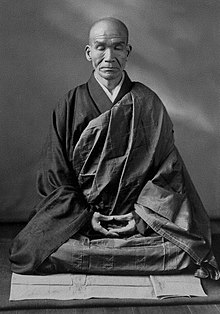You are currently logged-out. You can log-in or create an account to see more talks, save favorites, and more. more info
Zazen Talks

Zazen is a meditative discipline that is typically the primary practice of the Zen Buddhist tradition.
The generalized Japanese term for meditation is 瞑想 (meisō); however, zazen has been used informally to include all forms of seated Buddhist meditation. The term zuòchán can be found in early Chinese Buddhist sources, such as the Dhyāna sutras. For example, the famous translator Kumārajīva (344–413) translated a work termed Zuòchán sān mēi jīng (A Manual on the Samādhi of Sitting Meditation) and the Chinese Tiantai master Zhiyi (538–597 CE) wrote some very influential works on sitting meditation.
The meaning and method of zazen varies from school to school, but in general it is a quiet type of Buddhist meditation done in a sitting posture like the lotus position. The practice can be done with various methods, such as following the breath (anapanasati), mentally repeating a phrase (which could be a koan, a mantra, a huatou or nianfo) and a kind of open monitoring in which one is aware of whatever comes to our attention (sometimes called shikantaza or silent illumination). Repeating a huatou, a short meditation phrase, is a common method in Chinese Chan and Korean Seon. Meanwhile, nianfo, the practice of silently reciting the Buddha Amitabha's name, is common in the traditions influenced by Pure Land practice, and was also taught by Chan masters like Zongmi.
In the Japanese Buddhist Rinzai school, zazen is usually combined with the study of koans. The Japanese Sōtō school makes less or no use of koans, preferring an approach known as shikantaza where the mind has no object at all.